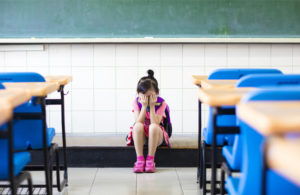
In what feels like a coordinated attack, schools across the country are pushing the controversial “critical race theory,” curriculum that targets white students as oppressors. Parents are furious and wonder why valuable time in the school day is being taken to make their children feel guilty rather than being spent on academics.
Andrew Gutmann, a New York City parent, loudly voiced his disapproval with the overwhelming “diversity, equity and inclusion” curriculum at his daughters’ school. And now parents in South Lake, Texas have ousted the school board members of the Carroll Independent School District who were planning to track “microaggressions,” intentional or unintentional, as part of students’ disciplinary record. Reason reports:
Mainstream reporting on the school board elections for Carroll Independent School District—a total rout for candidates who supported the plan—was extremely negative in tone, all but accusing Southlake voters of endorsing racism. But a quick perusal of the plan suggests that there were perfectly valid reasons to vote against it.
The proposal was conceived in response to two incidents involving Southlake high school students using racial epithets. Neither incident occurred on school property, which limited administrators’ ability to respond to them: Hateful speech is protected by the First Amendment, and it is proper to resist the notion that public schools’ punitive powers should extend well beyond the campus.
The plan includes some aspects that are benign or even praiseworthy. (There’s nothing wrong, for example, with teaching and celebrating other cultures.) But it also instructs schools to track “microaggressions,” which it defines as “everyday verbal or nonverbal, snubs or insults, whether intentional or unintentional, which communicate hostile, derogatory, or negative messages to target persons based solely upon their marginalized or underrepresented group membership.” Under the proposal, students who commit such offenses should have them documented in their “discipline offense history.”
Many colleges and universities have systems for reporting and tracking microaggressions; for the most part, this has been a disaster. There is widespread disagreement on what counts as a microaggression, including among the minority groups the proposal would supposedly protect. Many students end up reporting each other—as well as faculty and staff members—for relatively harmless or negligible slights. This is baked in to the system, since it’s specifically noted that microaggressions can be unintentional. No less than Derald Wing Sue, the Columbia University psychologist who invented the concept of microaggressions, has expressed concerned about education administrators taking his ideas “out of context” and using them in a “punitive way.”
High schools keeping files on which kids have inadvertently used language that someone found insensitive? That seems like a recipe for disaster. Students’ permanent disciplinary records, after all, can significantly impact their college and job prospects. It’s one thing for a school to punish a student for calling another student a racial slur in the classroom. It’s quite another to be on the lookout for any alleged microaggression—a concept that in some hands includes innocuously asking where someone is from.
Action Line: Ask your children’s school administration whether or not they’ll be including “critical race theory,” in their curriculum next year, or if they already do. The answer might surprise you.
Watch Andrew Gutmann discuss his experience on Fox News:



